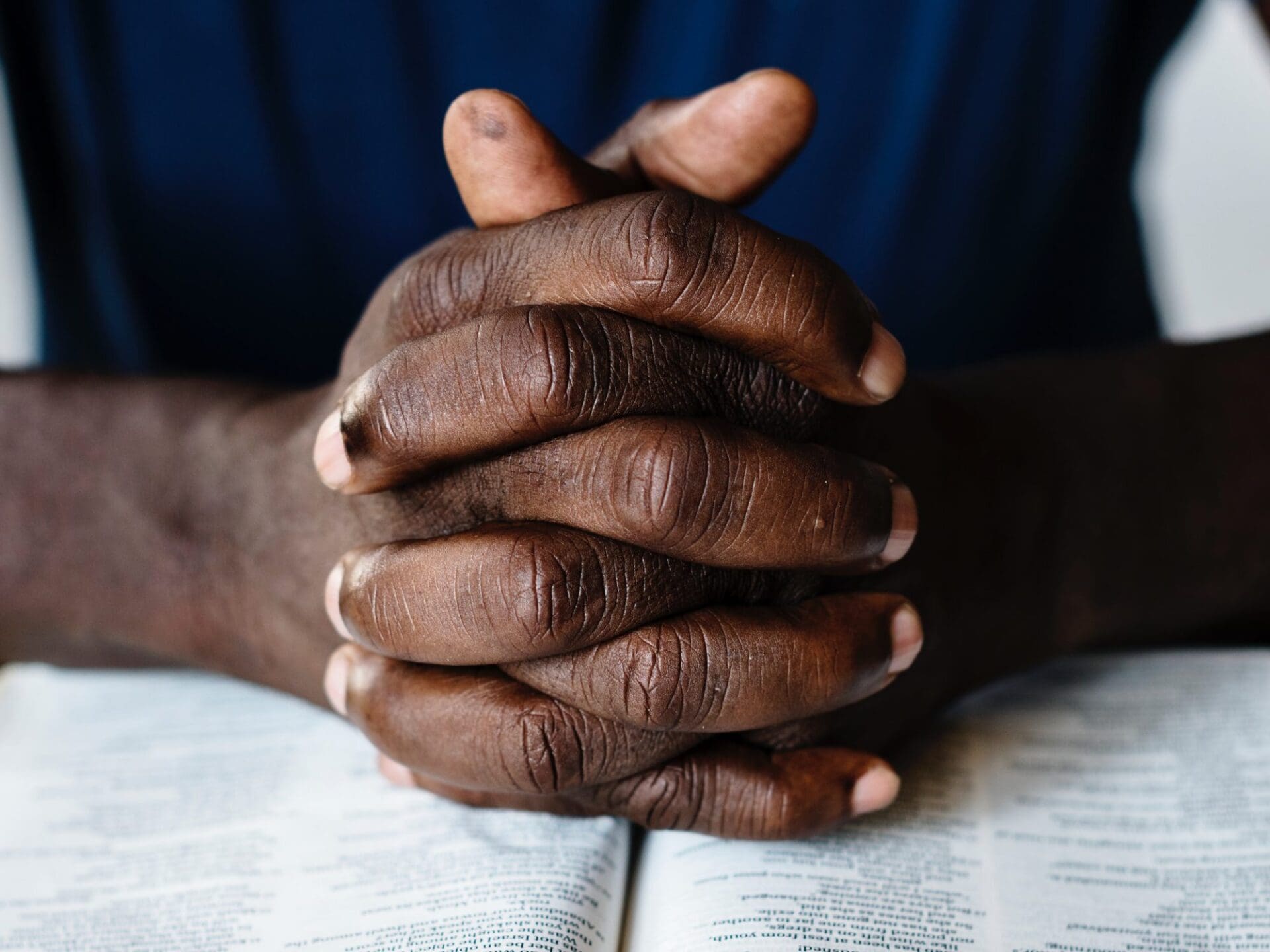
The Hike
Intercession
Hebrews 7:23–28

Jesus has a completed work for us in the past, a continuing work for us in the present, and a coming work for us in the future. The completed work of Jesus is that He has laid down His life as a sacrifice for our sins. He did this “once for all” (Hebrews 7:27). The coming work of Jesus revolves around His glorious return. In this session we will explore the continuing work of Jesus.
Motherhood involves both an initial and painful event in which a woman gives birth to a child and an ongoing process in which she cares for the child.
If you are a mother, you know what this is like. You lie there exhausted after the hours of labor you have endured, and within minutes, the nurse thrusts a tiny bundle of life into your arms and says, “This little one needs feeding!”
The completed work of giving birth is followed by the continuing work of caring for and supplying the needs of the child. A mother’s work is never done!
The ministry of Jesus our great High Priest also involves both a completed act and a continuing work. The completed act was the painful event in which He offered Himself as the sacrifice for our sins when He suffered and died on the cross.
The continuing work is the ministry in which He applies to us what He has accomplished on the cross and supplies all that we need to bring us safely home to heaven. The continuing work is Christ’s ministry of care, protection, and nurture that the Bible calls His intercession.
Many Priests, Many Sacrifices
There were many priests in the Old Testament: “The former priests were many in number, because they were prevented by death from continuing in office” (Hebrews 7:23).
When Aaron was about to die, he climbed the mountain of Hor with his brother, Moses, and his son Eleazer. Moses removed Aaron’s robes and put them on his son, indicating that Eleazer would assume the role of high priest (Numbers 20:22–29).
Throughout the Old Testament, there was one high priest after another. They all served for a time, but death prevented them from continuing in office. Sooner or later, they all had to take off the robes.
There were also many sacrifices in the Old Testament. Hebrews tells us that the Old Testament priests had to “offer sacrifices daily,” first for their own sins, and then for the sins of others (7:27). Every time a new sin was committed, there had to be a new sacrifice. So, the priest’s work was never done.
This point was illustrated by the design of the tabernacle where the priests exercised their ministry. In the first room there was a lamp, a table, and bread (Hebrews 9:2). Notice what’s missing. This room was beautifully lit. There was a table and some bread, but no chair. The priests could never sit down because their work was never done. There was always another sin to be dealt with, another sacrifice to be offered.
That was the story all the way through the Old Testament—many priests and many sacrifices. Sin was a problem never dealt with, and making sacrifices was a job never done.
One Priest, One Sacrifice
But now God has given us one High Priest who lives forever. Jesus “holds his priesthood permanently, because he continues forever” (Hebrews 7:24). Jesus went through death and triumphed over it. He lives in the power of an endless life. There will never be a time when the high priest’s robes are taken from Jesus! He is our High Priest forever.
Jesus is unlike any other priest: “He has no need, like those high priests, to offer sacrifices daily, first for his own sins and then for those of the people, since he did this once for all when he offered up himself” (7:27).
In contrast to the Old Testament priests, whose work was never done, Jesus offered Himself once for all on the cross, and when He ascended into heaven, He sat down. “We have such a high priest, one who is seated at the right hand of the throne of the Majesty in heaven” (8:1).
Jesus is seated because His work of offering Himself as the sacrifice for sin is done: “It is finished” (John 19:30). He made atonement for our sin so that no other sacrifice for sin will ever be needed.
Think of your sins as being like large rocks that you carry in a bag on your back. In the Old Testament, every time you felt the weight of a rock in your bag, you would go to the priest, who offered a sacrifice for that particular sin. Every time you committed another sin, you had to go back to the priest, and you needed another sacrifice.
The Old Testament priests took rocks out of the bag. Jesus takes the bag off your back! He deals with all your sin by separating it from you. He bore our sins on the cross and carried them for us (1 Peter 2:24).
The Bible tells us that if we claim to be without sin, we are deceiving ourselves (1 John 1:8). Your bag is never free from rocks, and God calls you to deal with the sin in your life. But your salvation does not depend on you emptying the bag. It depends on Christ removing the bag from your back.
Christians sometimes live as if we were still in the Old Testament era. When we sin, we feel as if we come under condemnation. But Jesus has dealt with our sins—past, present, and future—by nailing them to the cross (Colossians 2:14).
The reason there is no condemnation for you in Christ Jesus is not that there are no rocks in your bag, but that the bag itself has been lifted from your back. Jesus took it from you. He dealt with it fully and finally on the cross.
Jesus Lives to Save You
How would you complete this sentence: Jesus is able to save those who draw near to God through Him, because _________________?
If you said, “because He died on the cross for our sins,” you would be right. But Hebrews says something else. Jesus “is able to save to the uttermost those who draw near to God through him, since he always lives to make intercession for them” (Hebrews 7:25).
Intercession is the continuing ministry of Jesus. What Jesus is doing now is saving those who draw near to God through Him. He is doing everything that is needed to bring you through whatever you will face until you arrive safely in His presence in heaven.
Suppose that after Jesus died on the cross and rose from the dead, He retired in heaven and simply watched to see how we would get on. If He had only opened a way of salvation, and then left it up to us to pursue it, how many people would make it to heaven? None! Salvation would remain a theoretical possibility, and no one would actually be saved.
But Jesus lives to intercede for us, and when you draw near to God through faith in Him, Jesus will bestow on you everything He purchased through the shedding of His blood on the cross. Forgiveness, justification, reconciliation with God, adoption into His family, a new heart, the gift of His Holy Spirit—every blessing you enjoy and every gift of grace you receive comes through the intercessory ministry of the Lord Jesus Christ.
Jesus always lives to intercede for us. He never takes a day off! He is never distracted by something else! The continuing ministry of Jesus is to supply everything we need, and to make sure all His children are brought safely home. Jesus died to save you, He lives to keep you, and He will never let you go.
What Makes the Christian Life Possible
Throughout your Christian life, you will face all kinds of trials, challenges, temptations, sorrows, and conflicts. How will your faith survive? Christ always lives to make intercession for you. He brings your needs to the Father, so that everything you need will be supplied.
There is a beautiful illustration of this in the Gospels. Jesus knew that Peter would come under great pressure and told him, “Before the rooster crows, you will deny me three times” (Matthew 26:34).
Peter felt sure that he was up to the challenge of following Jesus, but Jesus knew that Peter would fail. He said to Peter, “Satan demanded to have you, that he might sift you like wheat, but I have prayed for you that your faith may not fail” (Luke 22:31–32).
Peter failed big time when he denied Jesus, and that might have been the end of his story. But Jesus prayed that his faith would not fail, and Jesus’ prayers were answered when Peter was restored.
What Jesus did for Peter is a wonderful picture of what He continues to do for us. Christ intercedes for you. This does not mean that Jesus is on His knees in heaven agonizing in prayer as He did in the Garden of Gethsemane. No, He is seated at the right hand of the Father, and what He asks, the Father gives.
The intercession of Jesus is what makes the Christian life possible. Christ speaks with authority in the presence of the Father, and His word releases the resources of heaven for the pressures and temptations you are facing today.
Christ gives strength to match the particular burdens you carry in any season or circumstance of your life. When He doubles your load, He can also double your strength.
Help When You Pray
Knowing that Jesus intercedes for you will give you a new incentive to pray. When we feel that our prayers are feeble and that our faith is weak, we may prefer to have a pastor or priest pray for us than to pray ourselves. But what we are being told here is that we already have a priest who prays for us.
Jesus is your great High Priest and He intercedes for you. He stands in the gap between you and the Father, and He brings your requests to the Father on your behalf. So, when you make a stumbling attempt at prayer, remember that Jesus brings your prayer before the Father.
Jesus said, “Whatever you ask of the Father in my name, he will give it to you” (John 16:23). To ask in Christ’s name means to ask according to His will. The promise is that every time you pray something that aligns with the will of Jesus, He presents your request to the Father. With Christ as your intercessor, nothing you ask in His name will be denied to you, because nothing that He asks of the Father will ever be denied to Him.
Opened
Jesus Christ has completed the work of offering Himself as the sacrifice for our sins. He now engages in His continuing work for us in heaven. He saves us, applying what He accomplished on the cross. He intercedes for us, releasing all that we need for the Christian life. And He presents our prayers to the Father, giving us confidence that our prayers will be heard and answered.
Hebrews 7:23–28
23 The former priests were many in number, because they were prevented by death from continuing in office, 24 but he holds his priesthood permanently, because he continues forever. 25 Consequently, he is able to save to the uttermost those who draw near to God through him, since he always lives to make intercession for them.
26 For it was indeed fitting that we should have such a high priest, holy, innocent, unstained, separated from sinners, and exalted above the heavens. 27 He has no need, like those high priests, to offer sacrifices daily, first for his own sins and then for those of the people, since he did this once for all when he offered up himself. 28 For the law appoints men in their weakness as high priests, but the word of the oath, which came later than the law, appoints a Son who has been made perfect forever.
(ESV)
Use these questions to further engage with God's Word. Discuss them with another person or use them as personal reflection questions.

Take the First Step to Open Your Bible
Join 35,000+ people who get ‘Open Weekly’. Every Wednesday, you’ll get hand-picked resources designed to inspire, encourage, and challenge you in opening your Bible.
Join Pastor Colin In-Person!
Do you want to understand the Bible story? 📖
Pastor Colin Smith’s upcoming event FLY THROUGH THE BIBLE, is a high-altitude exploration of the entire Bible story. This brief introduction to the Bible will help you grasp who God is, who you are, who Jesus is, and what He offers to you!
Coming to 4 cities this fall:
- St. Louis, Missouri
- Twin Cities, Minnesota
- Des Moines, Iowa
- Indianapolis, Indiana
Will you join us?

It looks like you're viewing the site from outside the US. Click below to visit our UK site or close this pop-up to view the international site.
